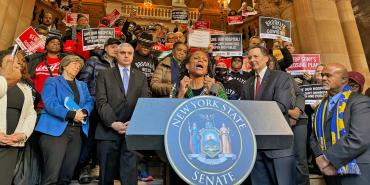A strong and united front has formed to oppose the planned closure of Downstate Health Sciences University Hospital in Brooklyn, N.Y. Healthcare professionals, community activists, elected state officials and labor leaders have made it clear that Downstate needs to stay open; but beyond these voices, the true testament is in the sentiments of community members.
A new Hart Research poll shows that the central Brooklyn community overwhelmingly supports keeping SUNY Downstate open and rejects the plan by Gov. Kathy Hochul and State University of New York Chancellor John King to close the facility, which provides critical trauma, emergency, cardiac, and transplant services and nearly 4,000 jobs that serve predominantly communities of color.
“Many believe they receive very good care from the hospital,” says Guy Molyneux, a Hart Research partner. According to the poll, 79 percent oppose shutting down SUNY Downstate. When asked why, many expressed the belief that it would have a range of negative impacts on the Brooklyn community, including longer wait times for emergency care and surgeries; and 75 percent expect a negative impact on the local economy because of the prospect of a lot of jobs being lost at the hospital. In addition, a majority expect to see a negative effect on their community's access to high-quality hospital care and perinatal care in particular.
Redetha Abrahams-Nichols, president of United University Professions Downstate chapter and a registered nurse at the hospital, conveys her commitment to fighting against the closure. “Since the day I walked through the door in 2001, there have been talks about closing this hospital,” she says. During her 23 years of service, she witnessed the hospital's vital role in the community. Abrahams-Nichols denounces the closure as a plan fueled by racism and social injustice, predicting dire consequences that would create health disparities in the community, particularly for maternal health. “Downstate is the oasis of healthcare for marginalized Black and brown people in central Brooklyn,” she says. “Now, they want to close the hospital, the facility that provides excellent care to Black and brown people. We will not allow it. We will not be silenced, ignored or discriminated against. We will fight this plan to close Downstate. The plan is disastrous, and if we fail, the people of central Brooklyn will die.”
Melinda Person, president of the New York State United Teachers, underscores the significance of listening to the community's voice. In her eyes, the poll speaks volumes about the genuine need for more healthcare, not less. She argues that the numbers in the state budget fail to capture the actual impact on lives and communities at risk. “If we were listening to the people of Brooklyn, the doctors, the nurses, the patient-focused organizations on the ground, we would not even dream of closing Downstate,” she says.
UUP President Fred Kowal highlights Downstate's role as a crucial healthcare facility and a diverse teaching center, particularly its role in preparing future healthcare professionals. According to Kowal, the poll represents a genuine reflection of the community's sentiments, in stark contrast to SUNY's purported community engagement. “This study is a true survey and analysis of how the community feels about its hospital. Community members were asked the questions, and they answered,” says Kowal. “No tricks, just the truth. That cannot be said for SUNY. Unfortunately, thus far, the governor has never gotten community input about its plan to close this hospital. We have heard from [the community]. They have told us that Brooklyn needs Downstate; and everyone in New York needs the healthcare provided there and the education of the next generation of professionals.”
“We are fighting this closure with everything we’ve got,” says AFT President Randi Weingarten. “We need to do it for the people who live there ... and for the core services they've got. And we need to do it because Downstate is an economic engine for central Brooklyn,” adds Weingarten, urging the governor and Legislature to take the closure off the table and collaborate to improve Downstate. “Let's work together to strengthen Downstate, to strengthen the work that Downstate does and to make it what it is intended to be, the gem of hospital systems throughout this great state.”
[Adrienne Coles]

